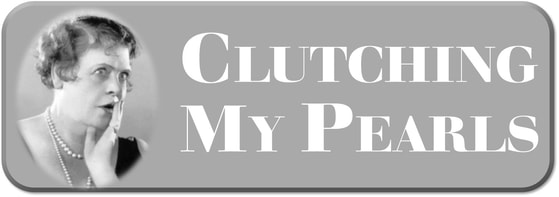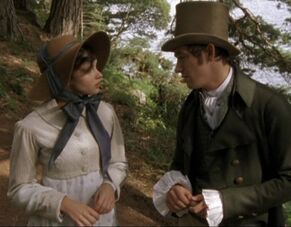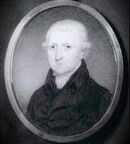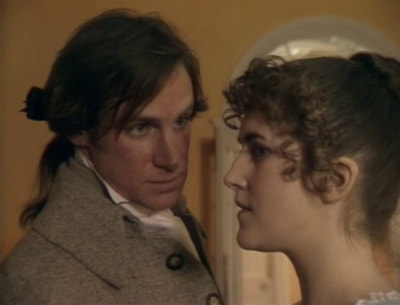| In Mansfield Park, Edmund asks Fanny what she thinks about Mary Crawford's sarcastic remarks about her uncle at dinner the night before: “I thought you would be struck, (says Edmund]. It was very wrong; very indecorous." “And very ungrateful, I think.” [says Fanny] “Ungrateful is a strong word. I do not know that her uncle has any claim to her gratitude; his wife certainly had; and it is the warmth of her respect for her aunt’s memory which misleads her here." |
| “The nicest—by which I suppose you mean the neatest. That must depend upon the binding.” “Henry,” said Miss Tilney, “you are very impertinent. Miss Morland, he is treating you exactly as he does his sister. He is forever finding fault with me, for some incorrectness of language, and now he is taking the same liberty with you. The word ‘nicest,’ as you used it, did not suit him; and you had better change it as soon as you can, or we shall be overpowered with Johnson and Blair all the rest of the way.” “I am sure,” cried Catherine, “I did not mean to say anything wrong; but it is a nice book, and why should not I call it so?” |
| “Very true,” said Henry, “and this is a very nice day, and we are taking a very nice walk, and you are two very nice young ladies. Oh! It is a very nice word indeed! It does for everything. Originally perhaps it was applied only to express neatness, propriety, delicacy, or refinement—people were nice in their dress, in their sentiments, or their choice. But now every commendation on every subject is comprised in that one word.” “While, in fact,” cried his sister, “it ought only to be applied to you, without any commendation at all. You are more nice than wise..." |
Not everybody is a Henry Tilney fan. But I don't think Austen intended for readers to dislike Henry for teasing Catherine about her use of the word "torment" when discussing home schooling:
| “That little boys and girls should be tormented,” said Henry, “is what no one at all acquainted with human nature in a civilized state can deny; but in behalf of our most distinguished historians, I must observe that they might well be offended at being supposed to have no higher aim, and that by their method and style, they are perfectly well qualified to torment readers of the most advanced reason and mature time of life. I use the verb ‘to torment,’ as I observed to be your own method, instead of ‘to instruct,’ supposing them to be now admitted as synonymous.” |
| “Oh! never, never, never! he never will succeed with me.” And she spoke with a warmth which quite astonished Edmund, and which she blushed at the recollection of herself, when she saw his look, and heard him reply, “Never! Fanny!—so very determined and positive! This is not like yourself, your rational self.” “I mean,” she cried, sorrowfully correcting herself, “that I think I never shall, as far as the future can be answered for; I think I never shall return his regard.” |
I'm not an expert on this, but I think there is a complete set of beliefs underlying this exchange, based on British Empiricism. Edmund is saying that a rational being should "never say never" because reason, reflection, and revelation (new evidence) can change your opinions. Edmund and Fanny know what he is referring to because he gave her the books to read and they discussed them together. I think Jane Austen was also exposed to the writings of the British philosophers such as John Locke through her father, and her educated readers would be familiar with them as well.
Thus corrected, Fanny knuckles under! She sorrowfully corrects herself.
Although Edmund does not come off very well in this exchange, I think these recurring conversations about word usage give us an insight into Jane Austen's upbringing; in the Austen home, language and the ability to express yourself with clarity and elegance was noticed and rewarded with parental attention, word play was a popular pastime enjoyed by the entire family, and corrections were given with love and a dash of playful humour.
| “My protégé, as you call him, [says Elinor] is a sensible man; and sense will always have attractions for me. Yes, Marianne, even in a man between thirty and forty. He has seen a great deal of the world; has been abroad, has read, and has a thinking mind. I have found him capable of giving me much information on various subjects; and he has always answered my inquiries with readiness of good-breeding and good nature.” “That is to say,” cried Marianne contemptuously, “he has told you, that in the East Indies the climate is hot, and the mosquitoes are troublesome.” “He would have told me so, I doubt not, had I made any such inquiries, but they happened to be points on which I had been previously informed.” “Perhaps,” said Willoughby, “his observations may have extended to the existence of nabobs, gold mohrs, and palanquins.” “I may venture to say that his observations have stretched much further than your candour." |
Previous post: Who is Miss Woodland? Next post: Preachy, moralizing heroines
| In A Different Kind of Woman, the final volume of my Mansfield Trilogy, Fanny actually pushes back when a man suggests she isn't thinking straight because she is unhappy. |




 RSS Feed
RSS Feed